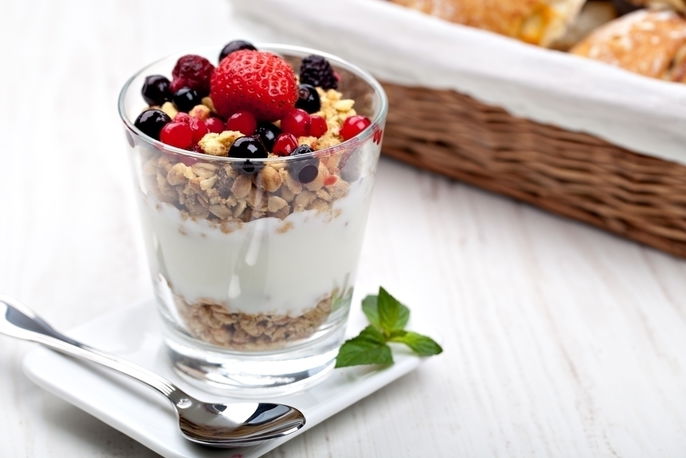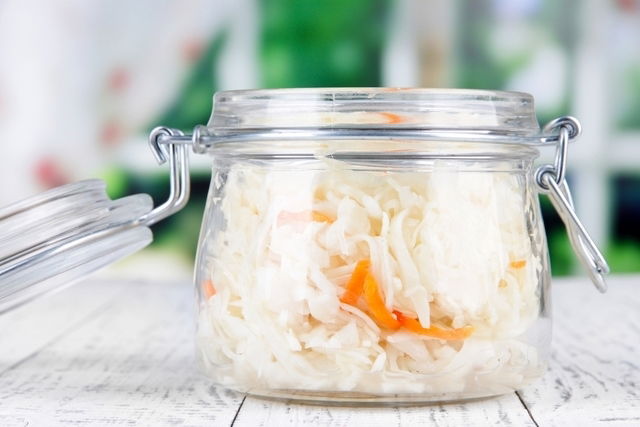Probiotic foods are considered to be very beneficial for your health, as they contain vitamins and minerals that are important for fueling the body, as well as bacteria and fermentation properties that help to maintain health. Probiotic foods promote optimal digestion and help to prevent illnesses like diabetes, gastritis or high blood pressure.
To take advantage of all the benefits that probiotic foods have to offer, you should eat at least one of these foods every day.
Fermented cheese, yogurt and milk are some examples of probiotic foods. Their benefits vary depending on the type and quantity of microorganisms present within them.

1. Yogurt
Yogurt is a probiotic food with an acidic flavor. It is made from fermented milk and can also contain fruit or other ingredients. This food is rich in protein, vitamins, and minerals and additionally contains lactobacillus and bifidobacteria, which are microorganisms that are beneficial to the body.
Benefits: Due to its high level of protein, yogurt helps to curb appetite, which helps with weight loss. The microorganisms present in yogurt help with the growth of good bacteria in the intestines, helping with constipation and vitamin or mineral absorption. Having healthy gut bacteria helps with the digestion of milk products, making it a great option for those with lactose sensitivities.
Yogurt also boosts the immune system by preventing cold and flu infections. It is also used to promote general bone and tooth health as it is rich in calcium.
How to consume it: Yogurt can be eaten on a daily basis. There are many options available for purchase, however you should opt for sugar-free yogurts without food coloring or additives. Yogurt should be stored in the fridge and can be consumed for breakfast or as a snack. You can even add fruit to yogurt, as the fiber in fruit can help to keep you fuller for longer.
2. Kefir
Kefir is a fermented drink with an acidic flavor. It is considered to be a complete probiotic food, as it is rich in calcium and B-complex vitamins, which contribute to optimal intestinal health.
Benefits: Kefir contains even more good bacteria than milk, making it a great option for people with lactose intolerant. It helps to keep gut bacteria balanced and can be used to prevent or treat diarrhea, constipation or other intestinal inflammatory diseases. Kefir is an anti-inflammatory and antioxidant food and can help to boost the immune system during colds, flus, cancer treatment and other illnesses.
How to consume it: It is possible to find kefir in natural health products and restaurants. There are many options available in terms of the type of milk used during fermentation (cow or goat milk for example). Some kefir products are used in smoothies or you can purchase kefir grains to make it yourself. Many interest groups online organize kefir swaps or donations for anyone wanting to prepare it at home.
3. Kombucha
Kombucha is a drink that is prepared by fermenting green or black tea with sugar. It has a sweet, refreshing taste, similar to a cider. This drink is rich in microorganisms that help to boost immunity, fight fungal and bacterial infections, and prevent many other health problems. Learn more about the benefits and preparation methods of kombucha.
Benefits: Because it is made from black or green tea, it kombucha is naturally rich in antioxidants that strengthen the immune system. It can prevent cold or flu infections, heart disease, diabetes and cancer. It also improves intestinal function and decreases the growth of harmful bacteria in the stomach, which can help with the prevention gastritis or stomach cancer. Some studies show that due to its high amounts of good bacteria, kombucha can help with the treatment of type 2 diabetes and weight loss.
How to consume it: Kombucha is usually found in natural health stores, but it can also be sold at restaurants. There are many flavors available, ranging from different fruits or spices. Kombucha can be consumed every day during any meal. It should be kept in the fridge.
4. Sauerkraut

Sauerkraut is a probiotic food that is made by fermenting cabbage with salt. It has a more acidic flavor profile, and contains high amounts of lactobacillus, minerals, and vitamins A, B, C and K. It is also low in calories.
Benefits: Sauerkraut is a probiotic food that has high fiber, bacteria and yeast content which can prevent constipation or diarrhea and promote optimal digestion. In addition, this food is rich in antioxidants which help to prevent many illnesses like some types of cancers, colds and the flu. Some studies show that daily consumption of sauerkraut can lead to improved intestinal flora levels and reduced symptoms of irritable bowel syndrome.
How to consume it: The recommended daily quantity of sauerkraut is between 7 and 10 g. It can be added to salads, sandwiches and other meals.
5. Miso
Miso is a traditional food in Japanese cuisine that prepared by fermenting soybeans with salt, barley, rice or rye, and koji (a type of fungus). This forms a paste, which is generally used as a seasoning for soups.
Also known as misoshiro, it is rich in proteins, vitamins (like vitamin K) and minerals (like manganese, zinc and copper).
Benefits: Miso is an excellent probiotic that helps maintain the health of beneficial intestinal bacteria. These bacteria are important for optimal gut functioning. Therefore, miso can help to boost your immunity to fight toxins and harmful bacteria, as well as promote digestion to reduce the chances of diarrhea, constipation and excess gas.
How to consume it: Miso is a soybean paste that is used as a base in the preparation of miso soup. This soup may also contain seaweed, mushrooms, onion and pumpkin, and can be consumed as an appetizer for lunch or dinner.
6. Tempeh
Tempeh is another food that is prepared by fermenting soybeans, and then pressing them to be compact. This food is traditional in Indonesian cuisine and vegetarian diets, and is rich in probiotics and proteins.
Benefits: Tempeh promotes intestinal health by combating constipation, preventing diarrhea and facilitating the way the body absorbs nutrients from food. Tempeh is also rich in antioxidants, which prevent diseases such as diabetes, cancer and high blood pressure.
How to consume it: Tempeh can be roasted, baked or grilled and eaten as an appetizer, snack or main dish.
7. Natto
Natto is a food that is made by cooking soybeans and adding Bacillus subtilis, which is bacteria that ferments them.
Benefits: Natto is an excellent probiotic that promotes digestive help and facilitates the absorption of nutrients. It is rich in vitamin K2 which helps to increase bone density and prevent osteoporosis in women.
Some studies have even shown that fermented soy foods can improve conditions associated with poor digestion and reflux. Consuming fermented soy-based foods once a day also improves cholesterol levels in the blood.
How to consume it: Natto is normally mixed with cooked rice and is seasoned with onion, coriander and chives. It is mainly consumed for breakfast.
8. Kimchi
Kimchi is a probiotic food that is made from fermented vegetables and salt. The most popular type of kimchi is prepared with cabbage, radish, red pepper flakes, garlic, ginger, anchovies, sugar, onion and salt. Kimchi is rich in vitamin C and B-complex vitamins, minerals and fibers. It is very low in calories and is considered to be one of the healthiest foods in the world.
Benefits: Because it is rich in nutrients like vitamin C, fibers and minerals, kimchi is a food that can promote optimal intestinal function and improve immunity. It can prevent many types of illnesses, like cancer, obesity and heart disease. Kimchi also slows down aging, as it decreases free radicals in the body, which are are molecules produced from natural chemical reactions in the body.
How to consume it: Kimchi is usually prepared at home and is served a side dish during meals. It is prepared by washing the cabbage and allowing it to dry completely. After adding the other ingredients, it is mixed well and fermented for at least 3 days in the fridge.
9. Cheese
Some cheeses, such as cheddar or mozzarella, have bacteria that are capable of surviving the natural aging of these cheeses, making them a great source of probiotics.
Benefits: These cheeses help improve and regulate natural intestinal flora. They are also rich in vitamins (like vitamin B12), and minerals (like calcium, phosphorus and selenium), which help prevent cardiovascular diseases and osteoporosis.
How to consume: cheddar cheese or mozzarella can be consumed daily, for breakfast or an afternoon snack, for example.
10. Pickles
Pickles are made with the natural fermentation of cucumbers in water and salt, which makes the cucumbers sour. They are a great source of natural probiotic bacteria.
Furthermore, this food is high in vitamin K, which is important for blood clotting, and is also low in calories.
Benefits: Pickles are high in bacteria that improve gut health and have a natural anti-inflammatory effect. This can help to promote digestion and reduce excess gas. Learn more about the benefits of cucumber and check-out our healthy cucumber recipes.
How to consume it: Pickles can be added to salads or sandwiches, although and excessive consumption should be avoided as they have a high salt content.






























